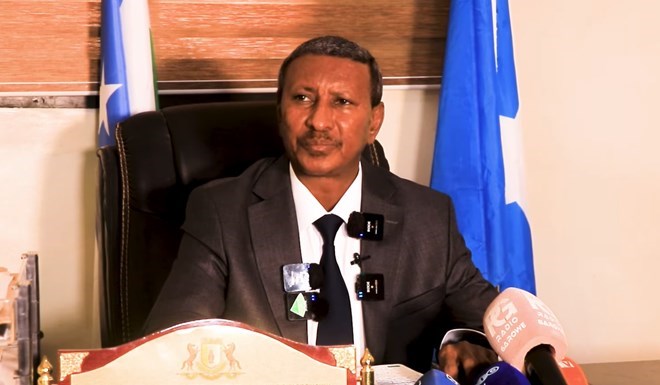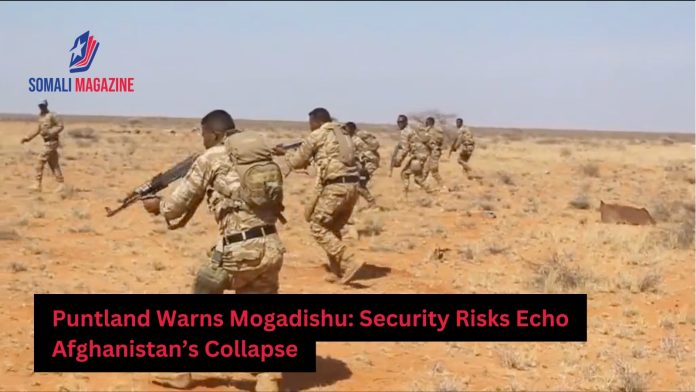Facebook Twitter Instagram Somali Magazine - People's Magazine
Puntland authorities have issued a stark warning about Mogadishu’s deteriorating security situation, drawing parallels to the collapse of Afghanistan following the U.S. withdrawal in 2021. The cautionary statement, delivered by Puntland’s Minister of Information, Dirir, highlights growing concerns over the Somali capital’s vulnerability to militant threats, particularly from the Al-Shabaab insurgency.
Speaking at a press conference in Garowe, Minister Dirir expressed fears that Mogadishu could face a scenario similar to Kabul’s fall, citing the escalating frequency and intensity of Al-Shabaab attacks. “We fear Mogadishu could face the same fate as Afghanistan if urgent measures are not taken to strengthen security and governance,” Dirir stated. He also claimed that most American diplomats had been evacuated from Mogadishu, although this assertion was later clarified as inaccurate. The U.S. Embassy in Somalia has not announced an evacuation but has issued a security alert warning of imminent threats, including potential attacks on Aden Adde International Airport.
The warning comes amid a surge in Al-Shabaab activity across central and southern Somalia. The militant group has intensified its offensive during Ramadan, seizing parts of the Middle Shabelle region previously vacated by the African Union Transition Mission in Somalia (ATMIS). Former National Intelligence and Security Agency (NISA) Deputy Director Abdisalam Guled has warned that Al-Shabaab is adopting a governance model reminiscent of the Taliban, seeking to gain public trust while consolidating control over strategic areas like Hirshabelle.
Despite these alarming developments, Somali Minister of Endowments and Religious Affairs Mukhtar Robow has dismissed fears that Mogadishu is at risk of falling to Al-Shabaab. “Mogadishu is neither Kabul nor Damascus, and Ahmed Diiriye is no Ahmed Sharaac,” Robow stated, referring to Al-Shabaab’s leader. He emphasized that unity among Somali forces and citizens is key to defeating the insurgents.
The fragile security situation in Mogadishu has also drawn criticism from Puntland officials, who accuse the federal government of failing to implement effective counterinsurgency strategies. Puntland, a semi-autonomous region in northeastern Somalia, has been at the forefront of combating extremist groups like ISIS and Al-Shabaab. However, Puntland leaders have frequently clashed with the federal government over issues of governance and resource allocation, further complicating efforts to address the country’s security challenges.

In February, Al-Shabaab militants temporarily captured Balcad, a town just 30 kilometers (19 miles) from Mogadishu, before being pushed back by government forces. The ease with which the group breached federal defenses underscored the fragility of Somalia’s counterterrorism efforts. Somali President Hassan Sheikh Mohamud has downplayed foreign concerns, describing them as “propaganda” and reaffirming his administration’s commitment to intensifying air and ground offensives against Al-Shabaab.
The international community has expressed concern over the escalating violence in Somalia, urging the federal government to prioritize security and governance reforms. The United States, a key ally in Somalia’s fight against terrorism, has provided air support and training to Somali forces but has also called for greater accountability and coordination among regional and federal authorities.
As tensions between Puntland and Mogadishu continue to simmer, the focus remains on preventing further destabilization and ensuring that Somalia does not follow the trajectory of Afghanistan. Puntland’s warning serves as a wake-up call for Somali leaders and the international community to address the root causes of insecurity and work toward a unified, sustainable solution.

